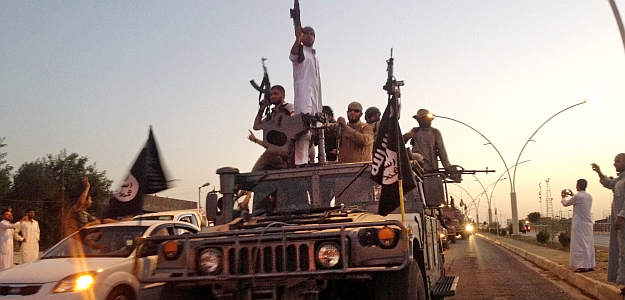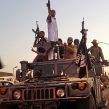
Moscow Suddenly Shows Concern About the Growing Influence in Russia of Islamic State
Publication: Eurasia Daily Monitor Volume: 11 Issue: 194
By:

The recent meeting between US Secretary of State John Kerry and Russian Foreign Minister Sergei Lavrov in Paris, on October 15, concluded on a positive note, according to the participants themselves. Secretary Kerry announced that Russia and the United States had agreed to an exchange of information about the Islamic State (IS) organization (Golos Ameriki, October 15). Ten days later, however, the foreign minister brusquely contradicted his US colleague’s statement (Interfax, October 25).
Coincidentally or not, a wave of arrests and detentions of people accused of involvement with the Islamic State organization took place in Russia after the Kerry- Lavrov meeting. In particular, the Federal Security Service (FSB) cracked down on suspects in Bashkortostan and Moscow (rosbalt.ru, October 27). Svetlana Gannushkina, a well-known Russian human rights activist who heads the Civil Society (Grazhdanskoe Sodeistvie) committee, confirmed this, saying that “such mass crackdowns are senseless; they resemble a sort of psychosis. The real criminals are not caught in such massive operations.” She added, referring to racially driven police operations in Russia: “The bandits should be arrested, not men with dark hair” (rosbalt.ru, October 27).
At the same time, authorities in Moscow announced a special operation dubbed Migrant 2014, which kicked off on October 23. The police arrested nearly seven thousand people in just one day. All of those arrested were taken to police stations and interrogated. (sngnews.info, October 25). Portraying the special operation as one against migrants provided it with a legal basis that allowed authorities to disguise the fact that it was in reality directed against Russia’s Muslim community. This operation will allow the security services to place several thousands of people under their surveillance and control.
Russian authorities also sought to disrupt Internet communities supportive of Islamic State. On October 24, the government’s Committee for the Oversight of Information Technology and Communications (Roskomnadzor) ordered Internet service providers to block 32 websites that have posted IS propaganda and extremist videos (lenta.ru, October 24). Next, the Prosecutor General’s Office addressed Roskomnadzor, asking it to limit access to pages on the Russian social network site VKontakte that spread extremist information (TASS, October 27). Since VKontakte is the largest social network in both Russia and in the countries of the former Soviet Union (liveinternet.ru, October 27), the crackdown on the Islamists is a well-thought-out operation.
A surprising statement by Chechen leader Ramzan Kadyrov about cutting Russia off from the Internet fits well into the context (Kommersant, October 21) of fighting those who support the Islamic State organization in Russia. Nearly everyone regarded Kadyrov’s words as a call on the government to deprive residents of Russia of the Internet, but this proposal should be seen within the specific framework of fighting IS. Kadyrov never says anything that would not be approved by Vladimir Putin or go against his opinion. Thus, Kadyrov’s proposal was not about shutting down the Internet in Chechnya or in some other region. Rather, Kadyrov proposed all-out persecution of those individuals who watch jihadist videos and read their speeches online. In Chechnya, unwanted activities on the Internet constitute a grave offense. Some people disappeared after they spoke out against the policies of the Chechen government (gazeta.ru, April 20, 2010) or were quickly identified after they published videos on the Internet supporting jihadis or spoke against Chechen government policies (instagram.com, September 20). Even those people who reside outside the republic are afraid to express opinions that go against the official leadership of Chechnya. “Repentant” local Salafis appear on republican TV quite often (YouTube, February 10). These broadcasts are designed not so much to show off repentant Salafists as to signal that those individuals who do not share the opinions of the Chechen authorities will be found and detained.
Russians pretended to perceive the primitive, amateurish threats made by random IS militants (YouTube, September 2) as if they were official threats by jihadist leaders (rbc.ru, October 10). Reports that Umar Shishani, the Georgian Chechen from Pankisi who is fighting with IS in Iraq, made threats against Russia during a telephone conversation with his father that was intercepted by the authorities also turned out to be false (Bloomberg, October 9). Shishani’s father said he had not spoken with his son for several years (topnews.ru, October 9). But some so-called “Caucasus experts” again started to talk about threats to Russia emanating from Georgia’s Pankisi Gorge, which is populated by ethnic Chechens (voenkor.info, October 9). These particular experts, incidentally, came from the Russian Institute for Strategic Studies, which is chaired by Leonid Reshetnikov, a Russian Foreign Intelligence Service general (riss.ru, accessed October 31).
In reality, the IS does not pose a real threat to Russia as of now (dw.de, October 23), especially given the fact that there are only about 1,500 Chechens fighting in the ranks of the IS. If several dozen of these fighters decide to return home and join the militants fighting in the North Caucasus, then the situation in the region will not change dramatically. The display of action targeting the Islamic State organization in Russia is designed primarily for Western consumption: Russia needs to show that it is still fighting international terrorism, and to do so it needs to be part of the coalition being created to fight Islamic State. But for Russia to become an official member of this Western coalition it would mean that Moscow would lose everything it did until now to support the Syrian regime of Bashar al-Assad. The coalition would benefit little from Russia’s participation, since Moscow is unlikely to have more information about the IS than the Western coalition on its own. For the first time since the era of Ronald Reagan, Russia finds itself in a situation in which it has no allies in its standoff with the United States.




